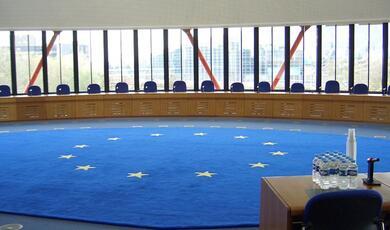Do governments and societies need enemies?
Share
- Details
- Text
- Audio
- Downloads
- Extra Reading
This lecture explores the ways in which political enemies are described and portrayed, and the extent to which this functions to sustain social cohesion and justify the powers of government.
Download Text
DO GOVERNMENTS AND SOCIETIES NEED ENEMIES?
Professor Rodney Barker
*1 PICTURE
A paradox: enemies as the friends of government
Government, and obedience to it, is normally justified by the dangers which are thereby prevented
This was the case put by Thomas Hobbes, writing in 1651 in a Europe in a turmoil of civil wars, where firm government could seem the obvious and only response to the threat from all kinds of internal and external enemies, and where the existence of those enemies and those threats was the clearest possible justification for governments to command, and subjects to obey:
'The final cause, end, or design of men, who naturally love liberty, and dominion over others, in the introduction of that restraint upon themselves, in which we see them live in commonwealths, is the foresight of their own preservation, and of a more contented life thereby; that is to say, of getting themselves out from that miserable condition of war, which is necessarily consequent ...to the natural passions of men, when there is not visible power to keep them in awe'
Government is necessary because otherwise each person would be an enemy to every other
There are of course real threats. Crime exists within societies, and other societies which threaten them with invasion or raids on their resources.
So a prima facie case will always exists for national unity in support of government, the muting of criticism, and extensions of governmental power.
But it is not simply that government is a response to the existence of threats and enemies. Governments frequently spend a lot of energy in giving graphic accounts of enemies and the threats they pose.
If there were no threats, there would on this scenario be no need for government. Hobbes was right, but only half right. Government may be necessary because otherwise people will be threatened, harmed, robbed, and killed by those who can accurately be described as their enemies.
But from the side of government, the greater the threat, the firmer the grounds on which the case for government is based, the greater the justification for calling for loyal obedience
The more grave the threat is presented as being, the more threatening or wicked the described enemy, the greater the case for unity, the greater the case against criticism and dissent, the greater the case for governmental power.
That of course raises a fundamental question about what Government is, what it does, and what it is for.
Government
The essential functions of government: internal order; justice; external defence; the well being of subjects. One and three are responses to enemies, and therefore the depiction of enemies justifies and requires governmental action
So Hobbes's argument can be reversed:
Not so much government as a response to enemies, as Government as dependent on enemies, and the governing identity as constantly enhanced by enmity narratives.
Without threats and enemies, without foreign perils and internal crime and disorder, government would be reduced to a welfare organisation.
That of course was the dream of political thinkers as diverse a Lenin and Sidney Webb
But to depict an enemy is at one and the same time to justify the need for government, and to sustain the solidarity and unity of society in the face of a common threat.
So is there another side to the relationship between enemies and threats on the one hand, and government on the other. Do governments need Enemies or a belief in enemies in order to govern? Do societies need enemies or tales about enemies in order to tell themselves who they are?
If the answer it 'yes' or even 'sometimes', then governments have a perverse incentive to indicate and even exaggerate the existence of threats and enemies, just as doctors have a perverse interest in the existence of disease.
The accounts which political leaders and governments give of their enemies will therefore normally have an element of truth, but there will also be an incentive to exaggerate, to give an account of enemies which justifies as firmly as possible, the policies of rulers.
The most stark example of the cynical use of stories about enemies to gain the support or collaboration of those to whom you tell the story, is not typical, but illustrates the incentives very clearly:
This is the protection racket. In this instance, there is of course a threat, but it comes from the person telling the story, and the person is offering to sell protection against himself.
But do governments, parties, leaders, and societies do something at least a little bit similar? Does the depiction of enemies help governments to govern, or give cohesion to societies which might otherwise squabble amongst themselves?
2* PICTURE
Uccello, George and Dragon
The deliberate use of accounts of threats and enemies
There have always been political leaders who have recognised the value of stories about external enemies in preventing internal dissent, in uniting a country against a foreign threat, and mobilising the population behind whatever it is the government wishes to do.
One of the most cynical accounts of this is, allegedly, from Herman Goerring, according to the psychologist assigned to him during the 1946 Nuremburg War Crimes Tribunal, Gustave Gilbert, in his diary:
Goering: Why, of course, the people don't want war. Why would some poor slob on a farm want to risk his life in a war when the best that he can get out of it is to come back to his farm in one piece. Naturally, the common people don't want war; neither in Russia, nor in England, nor in America, nor for that matter in Germany. That is understood. But, after all, it is the leaders of the country who determine the policy and it is always a simple matter to drag the people along, whether it is a democracy, or a fascist dictatorship, or a parliament, or a Communist dictatorship.
Gilbert: There is one difference. In a democracy the people have some say in the matter through their elected representatives, and in the United States only Congress can declare wars.
Goering: Oh, that is all well and good, but, voice or no voice, the people can always be brought to the bidding of the leaders. That is easy. All you have to do is tell them they are being attacked and denounce the pacifists for lack of patriotism and exposing the country to danger. It works the same in any country." April 18 1946.
What the right could do, the left could do just as well
The films of Sergei Eisenstein made under Stalin in 20th Russia are full of powerful, and cruel, rulers whose acts are justified and made to seem both necessary and heroic by the melodramatic presentation of external enemies and internal traitors:
Ivan the Terrible has his special bodyguard and execution squad because Europe and Germans threaten him from without, and aristocratic conspirators threaten him from within. And the more vividly the enemy is presented as menacing and evil, the fewer grounds there are to question the acts of the Tsar.
Abraham Lincoln was well aware of the value of enemies in sustaining internal solidarity
"the deep rooted principles of hate, and the powerful motive of revenge, instead of being turned [by Americans] against each other, were directed exclusively against the British nation." Since then, however, in the absence of a menacing external foe, the "passions of the people" could be expected to divide and weaken the republic rather than to unite and strengthen it.
Cf Shakespeare's Henry IV's advice to his son:
I ... had a purpose now
To lead out many to the Holy Land,
Lest rest and lying still might make them look
Too near unto my state. Therefore, my Harry,
Be it thy course to busy giddy minds
With foreign quarrels
And it's not only civil war that can be averted with 'foreign wars': Any campaigns which present challenges to existing or dominant values, or to the dominant way of doing things, can be diverted by the existence, real, imagined, or real but exaggerated, of foreign threats.
Suffrage campaigners in the First World War, the foreign enemy trumps the domestic
Max Atkinson in Our Masters' Voices recommended an attack on an enemy as a sure fire way to get an audience on your side, a technique he demonstrated for World in Action shortly after the publication of his book in 1984, with a standing ovation at an SDP party conference for a complete political novice
So there is nothing new in talking of a 'war on terror', and arguing from that account for the need for national unity, support for the government, and extensions of governmental power
' you are either with us or with the terrorist'
John Reid and ID cards.
'ID cards are an important consideration in the future of the protection of the public, and quite frankly it ill behoves people to stand up and demand the ends that they say the public want and then on every occasion oppose the means of achieving those ends.'
Reid went on to attack 'the Liberal Democrats' national position, which is to refuse to back every single measure that improves local police effectiveness and local antisocial behaviour campaigns. As ever, whether on local issues such as this or on their refusal to countenance the means necessary to combat terrorism and organised crime'on ID cards, for example,'
Similar arguments were used in the United States to justify the provision of the Patriot Act, October 2001, whose very title claimed that criticism was treasonable, which increased the ability of law enforcement agencies to search telephone and email communications and medical, financial, and other records;
George W Bush March 2006 'The terrorists have not lost the will or the ability to attack us. The Patriot Act is vital to the war on terror and defending our citizens against a ruthless enemy. This bill will allow our law enforcement officials to continue to use the same tools against terrorists that are already used against drug dealers and other criminals, while safeguarding the civil liberties of the American people."
The role of asking the right (misleading) question. Do you want to act against terrorism, identity theft, illegal immigration and benefit fraud?
(Frank Cousins and nuclear war again)
The trick is to make it difficult or impossible to question the premise, the account of the threat,
Historical examples are frequently used for this closure of the argument technique:
Underplaying danger Munich,
& in fiction:
Tolkein,
Invasion of the Body Snatchers,
In the use of accounts of enemies to justify government and cultivate support for its policies, accounts of treason can often be the most powerful
Before the development of states which were either democratic, or which in someway mobilised all their subjects into 'the nation', treason was an almost personal act or accusation:
Disloyalty to the king or the prince
But once the justification for government is the protection of the people, and there is an idea of a nation, treason takes on a much more extensive role:
It is an attack on a whole society
And as such, its application is virtually unlimited
The many uses of treason Hans Magnus Enzensberger writing in 1973 and the limitless utility of accusation of treason.
Treason trials under Stalin - the endless category of evidence of treason
The Egyptian blogger:
Abdel Kareem Soliman was in February 2007 sentenced to three years imprisonment. He had criticized his university, al-Azhar, which he called "the university of terrorism" and accused it of suppressing free thought. Just to prove how unfounded the accusation was, the university expelled him and urged the government to put him on trial. The judge said Soliman was guilty and would serve three years for insulting Islam and inciting sedition, and one year for insulting President Mubarak.
Two things of note here:
1. Insulting a religion can be the act of an enemy
2. The charge of sedition is worth noting here
Sedition is of course the most flexible of charges
But it is frequently described as a threat, not to the nation or society, but to the state.
We are back to disloyalty to the prince
It is as if, in more authoritarian societies, we have come full circle, and back to the pre-modern idea of treason: the essence of treason is not to emperil the nation, but to emperil its rulers
So in China at the start of the Twenty First Century, Wang Xiaoning was imprisoned in September 2003 for 10 years for the crime of "incitement to subvert state power" after he emailed electronic journals calling for democratic reform and an end to single-party rule
But enemies are seldom described in only secular terms:
There is a further reversion to what we might think of as premodern notions:
Stalin denounced : 'This counter-revolutionary scum*' '*nechist means an unclean devil in peasant folklore.'
But when we hear leaders of secular democratic states condemn 'an axis of evil', we should realise that religion, the metaphysical, and the super natural are never very far from the surface of even the most apparently mundane, secular politics.
Defending Society?
Rulers can use enmity, the accounts they give of enemies and alleged enemies, to sustain their position, ensure support, and discredit criticism
But society too can seek benefits through the stories told about enemies
Identity can be cultivated or asserted by contrast with an evil other
Do we need enemies, in order to tell us simply who we are?
What part do they play in the creation of identity ?
When we look at the way in which enmity is used to cultivate the identity of a society, or to cultivate identities WITHIN socieities, hatred and enmity very quickly acquire a religious character or at least a religious dimension.
God, I thank thee, that I am not as other men are, extortioners, unjust, adulterers, or even as this publican.
The dispute in the Anglican Church:
Giles Fraser, Anglican Vicar of Putney, writing in February 2007 in The Guardian:
'Evangelical Christians are always falling out with each other, splitting to form new churches and splitting again - all sides denouncing the others as having betrayed the true gospel. Monty Python got it spot-on: it's the People's Front of Judea versus the Judean People's Front. The only thing that can reunite the factions is something they all hate more than they hate each other. The idea of a gay bishop in faraway New Hampshire is an enormously useful tool of unity for otherwise fractious conservatives.'
The anarchist use of propaganda by the deed went even further with this mechanism, inducing your opponent to behave in a way that fits your prior description of him.
Inducing an opponent to threaten you in order to increase the solidarity of your supporters, and the number of those who support you, the extent of the sea in which the revolutionary fish can swim:
Hunger strikes by the suffrage campaigners, and by nationalists in Northern Ireland
The consequences of the Easter Rising of 1916, though almost certainly not intended, were of a similar kind.
But how this will work out is so enmeshed in particular circumstances, that any generalisation can only be one about possible consequences, not laws about certain outcomes.
The flexibility of enemies
Since the stories that are told about enemies are not scientifically accurate reports, but rhetorical devices, who your enemies are can change dramatically from one circumstance to another
4* PICTURE December 1983
5* PICTURE 2003
No simple or logical relation between the narrative and its referent, or between the narrative and its function
When the Scottish Presbyterian cleric, F. E. Watson, attacked in 1935 the provision of public funds for Roman Catholic schools, he complained of such expenditure being used for 'educating an increasing section of the population, in the main Free Staters or their offspring, in a faith and a loyalty hostile to the tradition and religion accepted by the vast majority of the Scottish nation...Why should we feed, clothe, and educate these people who everywhere plot and plan for the downfall of Great Britain.' The language was the language of treason and subversion, but the proposal was for a redirection of municipal educational funding.
Two opposed explanations: Sincerity and deception,
What are the available accounts?
Marx and the materialist basis of ideology
Weber and elective affinity: Weber's first version
Human action as meaningful behaviour: symbiosis, and Weber's account of action, his second version
'Beliefs' and 'actions' cannot be separated. They are different ways of talking about the same thing
Thought is always an action, and action is different from behaviour. So choice, and reason, take us beyond mechanical materialism.
There may be a real world out there, but it is one of many, and all we can hope for are more or less accurate, but always limited, narratives about what we experience
*6 PICTURE
All we have is what people say, and whilst their private thoughts are of biographical interests, they don't affect the public world.
Disadvantages and dangers
The enmity narrative is sustained in order to retain the credibility of the narrators. That can lead to major errors, identifying the wrong enemy, or attributing a misleading character to the enemy:
Robert McNamara, who had been United States Secretary of Defense under Kennedy and Johnson during the Vietnam War, speaking of the Cuban Missile Crisis of 1962 and the Vietnam War from 1965 to 1975, argued that American understanding of Nikita Kruschev had helped avoid catastrophe during the Cuban Missile Crisis, just as American failure to understand the Viet Cong had contributed to it.
John Foster Dulles, Secretary of State under Eisenhower, by contrast, was it is suggested so embedded in the idea of the Soviet Union as an evil and wholly alien power, that he could only see changes in Russian policy as weakness, never as real changes in the character or policy of the regime.
The strength of the perception of an enemy thereby prevented the US government from properly understanding the USSR and thereby from acting in a way most advantageous to itself
The enmity narrative which creates solidarity, can create also uniformity and intolerance.
Accounts will always need to be given of threats and enemies, there will always be threats and enemies, there will always be an incentive to exaggerate those threats and to resist critical questioning of those accounts.
The very stories which unite, can lead also to disaster. There is no magic answer.
©Professor Rodney Barker, Gresham College, 10 December 2007
This event was on Mon, 10 Dec 2007
Support Gresham
Gresham College has offered an outstanding education to the public free of charge for over 400 years. Today, Gresham College plays an important role in fostering a love of learning and a greater understanding of ourselves and the world around us. Your donation will help to widen our reach and to broaden our audience, allowing more people to benefit from a high-quality education from some of the brightest minds.


 Login
Login







